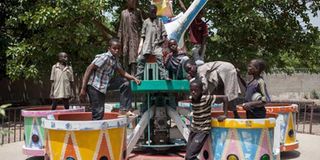Nigeria in dilemma as number of Boko Haram orphans grows

Children orphaned by Boko Haram Islamists play on a merry-go-round in an abandoned amusement park in Maiduguri, Nigeria, on April 27, 2017. PHOTO | FLORIAN PLAUCHEUR
What you need to know:
- They are among thousands of children orphaned by Boko Haram fighters now living in the capital of Borno state.
- In some of the far-flung camps on the border of Niger and Cameroon, where the battle is still raging, there are no schools.
- In Maiduguri, whose population has doubled to more than two million, thousands of children are slipping through the cracks.
MAIDUGURI
After a night on the streets, the pack of boys move into Maiduguri’s abandoned amusement park in the morning to play on broken-down rides.
Shoeless and in rags, they sprint to the merry-go-round.
The horses are motionless but the boys laugh like they’re in Disneyland.
They are among thousands of children orphaned by Boko Haram fighters now living in the capital of Borno state.
“They are internally displaced but are not in camps,” said Salisu Ismail, 42.
DENOUNCED WESTERN INFLUENCE
“They should be in school but they don’t have access.”
Boko Haram was founded by a preacher who advocated a fundamentalist interpretation of the Koran and denounced Western influence in Nigeria.
Poverty, joblessness and government corruption attracted followers even before the group turned to violence.
Officials fear the city will remain a breeding ground for extremism if the orphans aren’t taken care of.
Yet they face the dilemma of how to get thousands of homeless children back to school in a region where education has never been prioritised.
“We have an official number of 52,000 orphans in Borno,” governor Kashim Shettima said.
MONSTERS
“They may be more than 100,000. Half of them may be in Maiduguri. Without education, they will be monsters.”
Even as the army reclaims the last of the Boko Haram territory, the relentless assault on education continues to restrict development.
In some of the far-flung camps on the border of Niger and Cameroon, where the battle is still raging, there are no schools.
In Maiduguri, whose population has doubled to more than two million, thousands of children are slipping through the cracks.
“A lot have never been to school,” said Unicef official Samuel Manyok. “It’s as bad as Somalia and South Sudan.”
TRAUMATISING EXPERIENCES
Getting children whose lives have been shattered by Boko Haram into class is just one hurdle to reintegrating them into society when many have suffered traumatising experiences.
Sitting at a concrete table in the park, 15-year-old Aisha says she was the only one of her family to survive when Boko Haram raided her village in 2015.
When her parents refused to let her marry a fighter, the militants shot her father and tossed her mother into a makeshift prison full of urine and faeces.
Days later and starving, she let her daughter go.

Children orphaned by Boko Haram Islamists play on a merry-go-round in an abandoned amusement park in Maiduguri, Nigeria, on April 27, 2017. PHOTO | FLORIAN PLAUCHEUR | AFP
“He forced himself on me,” Aisha says of her “husband” with whom she lived in Sambisa Forest. “He would bring bombs and tell me to pour water on them, so they didn’t explode.”
Aisha says she saw militants strap explosives to children.
INVADED FOREST
In December, the military invaded the forest and rescued her. She lives with a man from her village in an IDP camp.
But she isn’t going to school. Asked what she wants to do in the future, she doesn’t seem to know.
Meanwhile, the 82 schoolgirls recently rescued have been reunited with their families.
The reunion took place on Saturday night in Abuja.
Men gripped their daughters in tight embrace, while mothers shrieked with joy, wiping away tears streaming from their eyes.
REHABILITATED
The girls and their parents had not seen one another since April 14, 2014, when Boko Haram fighters abducted 219 of them from their dormitories in Chibok.
Information and Culture press secretary Joe Mutah said the girls were being rehabilitated.
“We believe that in due course, they will be properly aligned with their families. Intensive medical attention will be given to them.’ he said, adding that 21 others rescued last year were undergoing psycho-social counselling.
Additional reporting by Mohammed Mommoh





